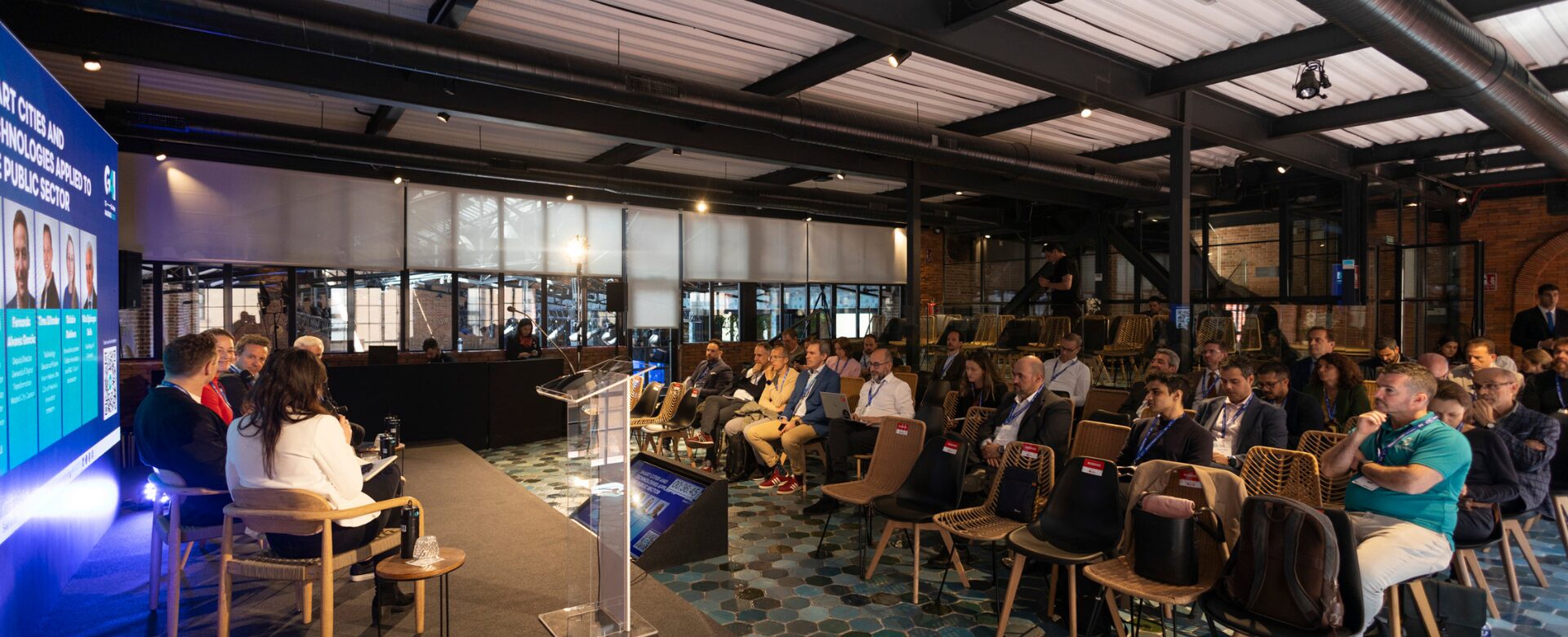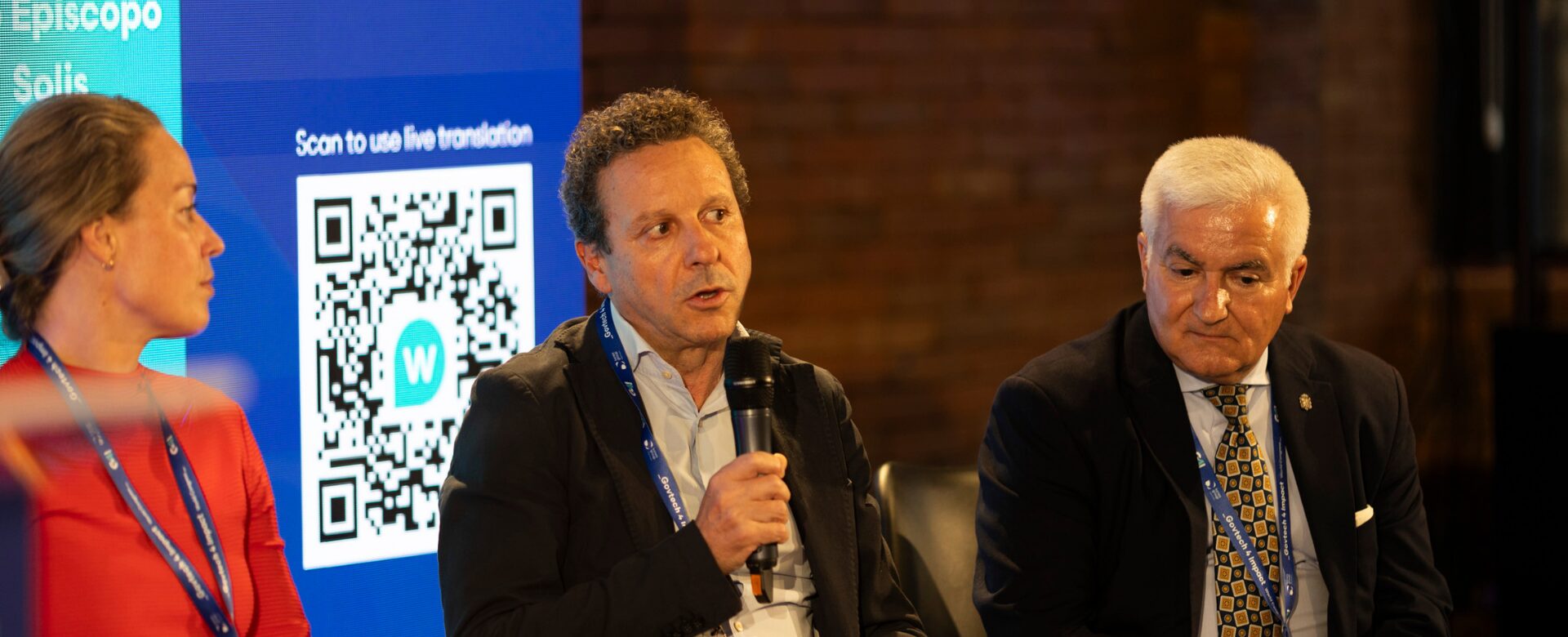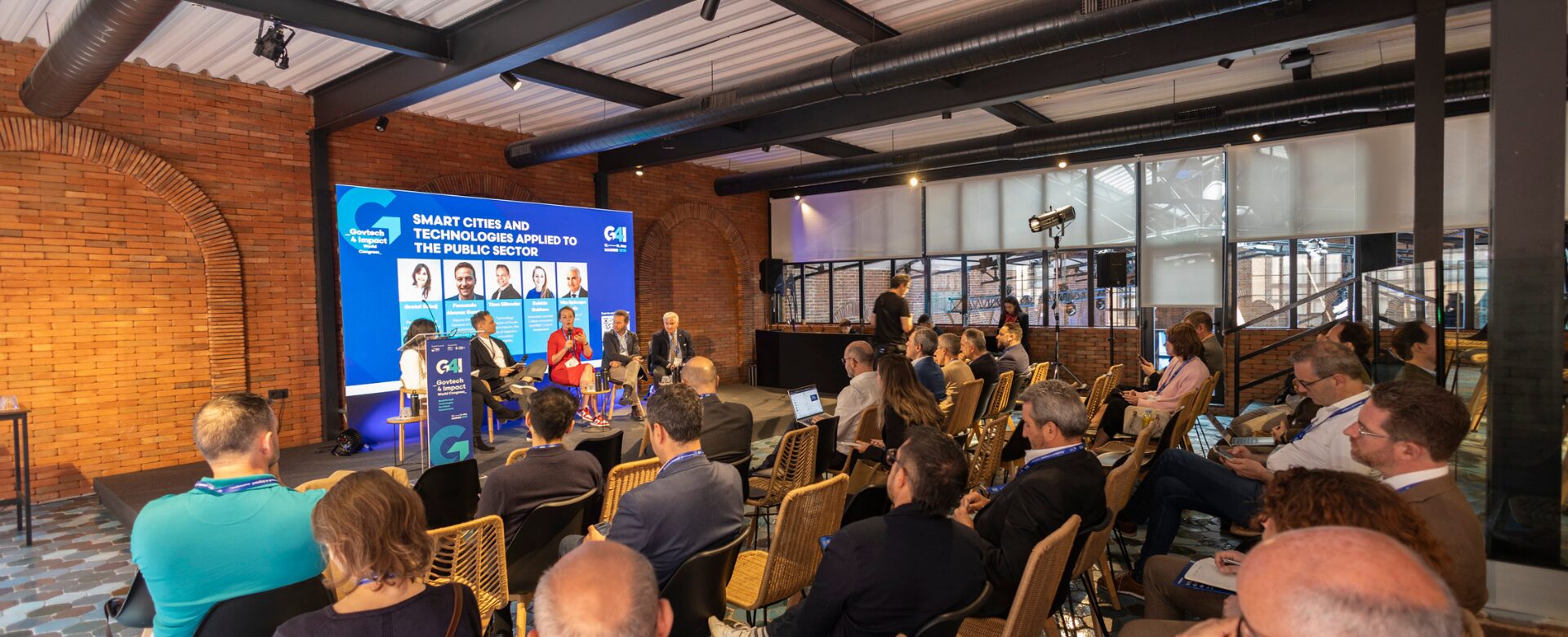How Innovative
Technologies
are Redefining
Urban Life and
Public Services
Fernando Alvarez Garcia,
Debbie Dekkers,
Timo Sillander,
and Vito Epíscopo Solís
GovTech in Latin America: Success Stories and Lessons Learned
Urban environments around the globe are on the cusp of a profound transformation, with smart city technologies emerging as powerful tools reshaping how municipalities deliver public services. At a recent roundtable at the GovTech 4 Impact World Congress (G4I), visionary city leaders and innovation experts gathered to discuss how technology is not just enhancing city life but fundamentally reimagining it. Moderated by Gretel Schaj, Research Group Member at the Center for AI and Digital Policy and Iberia Lead at BABLE Smart Cities, the roundtable underscored a powerful message: smart cities are fundamentally about improving human lives.
This engaging discussion featured notable experts in urban innovation:
- Fernando Alvarez Garcia, Deputy Director General of Digital Transformation, Madrid City Council.
- Debbie Dekkers, Innovation Pioneer, Urban Innovation and R&D, City of Amsterdam.
- Timo Sillander, Technology Director, Forum Virium Helsinki, the City of Helsinki’s innovation company.
- Vito Epíscopo Solís, Deputy Mayor of the Honorable City Council of Granada in Spain
Human-Centric Innovation: Helsinki’s Empowering Journey
Timo Sillander opened the discussion by sharing Helsinki’s inspiring approach to using technology as an enabler for social good. Highlighting the “Work Activities” initiative, he explained:
“The City of Helsinki developed a digitally supported coaching model and skills identification platform. It was aimed at individuals struggling to re-enter the workforce due to diverse reasons, from mental health problems to outdated skills. Technology allowed us to tailor rehabilitation programs to individual needs, enabling hundreds to regain their footing in working life.”
Timo emphasized how the real triumph was beyond tech deployment – it was about human lives transformed. “People spontaneously thanked the city for giving them back their dignity,” he reflected.

AI at the Service of Citizens: Amsterdam’s Proactive Approach
Debbie Dekkers emphasized that technology should never overshadow the human element, elaborating on a remarkable AI-driven citizen notification system:
“Amsterdam receives over 400,000 notifications yearly – mostly minor issues like garbage and graffiti. Typically, responses took weeks. We built an AI system that immediately matches citizen complaints to existing data, resolving up to 30% instantly.”
Crucially, citizens were informed when their response was AI-generated, maintaining transparency and trust. This approach allows city employees to focus on complex issues, demonstrating AI’s role in enhancing, not replacing, human-centric service delivery.

Real-Time and Adaptive Cities: Madrid’s Vision
Fernando Alvarez Garcia illustrated Madrid’s ambitious vision of a “Real-Time City,” a digital environment continuously adapting to citizen needs using IoT and advanced data frameworks. He underscored the city’s drive toward interoperability:
“Madrid created a dedicated IoT lab in collaboration with the Polytechnic University of Madrid. We’re crafting an interoperable framework, connecting everything from traffic lights to urban furniture. Data, clean and quality-driven, is the foundation, enabling real-time responsiveness to individual and community needs.”
Madrid’s strategy also emphasizes proactive collaboration with academia, industry, and other cities, exemplifying how modern smart cities must actively engage diverse stakeholders.

Granada’s AI-Powered Preservation of Heritage
Vito Episcopo highlighted the city’s strategic approach to applying artificial intelligence in addressing pressing urban challenges. Episcopo explained how Granada leverages AI in practical applications:
“Granada is using artificial intelligence to detect graffiti in real-time, enabling direct communication with the police to swiftly protect our valuable cultural heritage. Another critical application is controlling our low-emission zones, using AI to accurately identify vehicle types and emissions. This helps us significantly improve air quality and sustainability across the city.”

Episcopo also shared Granada’s larger ambition to become a collaborative leader in urban innovation:
“Collaboration among cities is essential. Granada is committed to leading by example and supporting other municipalities to harness AI effectively. We recently launched Spain’s first AI Demonstration Center, a dedicated space where technologies can be tested, piloted, and showcased to other cities. Our goal is to demonstrate how AI solutions can make tangible impacts, helping cities everywhere address their unique challenges.”
With these initiatives, Granada positions itself at the forefront of using AI thoughtfully and effectively to transform urban life for the better.
Building Trust Through Collaboration
The conversation also addressed a fundamental challenge: trust. The panelists shared practical insights into earning trust from citizens, public officials, and other stakeholders.
Timo Sillander’s honest reflection summed up the approach clearly: “You need to sell innovation repeatedly, transparently involving everyone—from citizens to officials—through every step. Don’t just develop solutions for them; develop solutions with them.”
Adding a playful twist, the roundtable participants humorously portrayed their cities’ digital transformation as dating profiles. Amsterdam, for instance, humorously admitted it brings “a million opinions” to any relationship, referring to its proactive citizen engagement, while Helsinki openly stated, “We’re great at starting new things, but occasionally struggle to let go of the old.”

This candid exercise underscored the roundtable’s broader theme: successful digital transformation demands honesty, humor, and humility.
Closing with practical advice, the speakers emphasized embracing innovation through rigorous experimentation, stakeholder collaboration, transparency, and adaptability. As Debbie Dekkers summarized:
“Try, explore, learn, fail, and show your results. It’s the only way governments can become genuinely proficient at using technology.”
Key Takeaways: How Innovative Technologies are Redefining Urban Life and Public Services
- Human-Centric Innovation: Helsinki’s “Work Activities” program highlights the transformative power of technology in helping individuals, especially those with challenges, reintegrate into the workforce.
- AI for Proactive Service Delivery: Amsterdam’s AI system efficiently handles minor citizen issues, freeing up resources for more complex tasks while maintaining transparency and trust.
- Adaptive Cities in Real-Time: Madrid’s “Real-Time City” vision integrates IoT and data to create a responsive urban environment, evolving with citizens’ needs through collaborative efforts.
- AI for Preservation and Sustainability: Granada uses AI for graffiti detection and emission control, positioning itself as a leader in AI-driven urban innovation and collaboration.
- Building Trust through Collaboration: Successful innovation requires transparency and continuous collaboration with citizens and officials, ensuring solutions are developed together.
- Experimentation is Key: Cities must embrace innovation through testing, learning, and adaptation to drive effective digital transformation.
This G4I roundtable didn’t just celebrate technological solutions – it illuminated how true smart cities leverage technology to profoundly human ends, transforming urban spaces into responsive, inclusive, and dynamic environments that work for all citizens.
